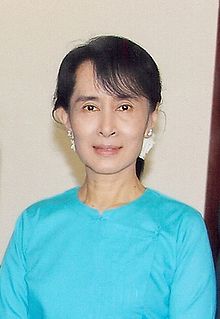
NAY PYI TAW (TIP): Myanmar‘s prodemocracy leader Aung San Suu Kyi on Thursday said that she aspires to be the president of Southeast Asian country although the Constitution bars her from contesting elections in 2015. The Nobel laureate’s candidature for the job has been speculated for the past few weeks. “I want to run for president and I’m quite frank about it. If I pretended that I didn’t want to be president I wouldn’t be honest,” she said at a conference organised by the World Economic Forum, an event seen to bring Myanmar into the mainstream after five decades of military rule.
The 67-year-old leader, who studied at Delhi’s Lady Shri Ram College, recognized her bid for the top office wouldn’t be easy given that the military still controlled 25% of the seats in Parliament and major Constitutional amendments, required to enable her to contest, required at least 75% support. It then had to be followed by a referendum where at least 50% voters would have to support the move. At present, Myanmar nationals with a foreign spouse or children are barred from holding the top job.
“I am told it’s the most difficult Constitution to amend… Twenty-five per cent (MPs) are unelected military appointments. What we need is that all the civilian seats are filled and we have an agreement on the amendments. Then, we need at least one brave soldier who must support it. It’s very difficult, but not impossible,” she told reporters later in the evening. For a country that is in the midst of change, there is growing expectation, especially abroad, that she would be elected president and the army would ease out of power.
After keeping Suu Kyi under house arrest for 15 years, the rulers not only released but even allowed to contest elections and she has been a member of parliament since 2010. Her party, National League for Democracy, is widely expected to come to power if free and fair elections are held. Although Myanmar is changing, Suu Kyi called for faster pace of reforms so that the benefits of inclusion reach everyone. “The government can do more. It has concentrated enough on good intentions but the results are not as fantastic as they can be.
Three years is not a short period… We don’t want people to lose faith in the reforms process,” she told journalists while identifying job creation as the biggest challenge. Asked identified better infrastructure, improved healthcare and education systems as well as land reforms as the other priority areas. Suu Kyi is hailed across the world, her recent silence over ethnic violence has been criticized. But she defended it saying she did not want to come out in support of one group or another as it would result in more extremism. “At the moment nobody seems to be very satisfied with me because I’m not taking sides… It’s just that they are not hearing what they want to hear from me.”





Be the first to comment